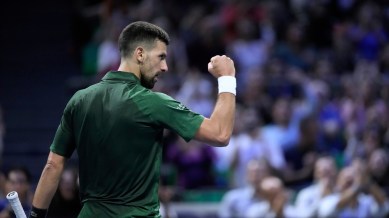Behind Novak Djokovic’s move to Greece, his support for student protests in Serbia
Novak Djokovic was hailed as 'Serbia's greatest ambassador to the world' by the country's president Aleksandar Vucic. He has, however, fallen out of favour with the government and has been the target of state propaganda media outlets

Serbian tennis great Novak Djokovic has been working on his Greek. Earlier this week, at his family-backed Hellenic Open, Djokovic drew applause from the crowd at Athens’ iconic multi-purpose Panathenaic Stadium when he briefly spoke in the local language, saying ‘Good evening Greece. I love you’ during an on-court interview.
Sounding like a platitude that a global tennis star parrots at every city stopover on the calendar? Only it wasn’t. The 24-time Grand Slam champion was ‘breaking the ice’ with people in his new hometown, the Greek capital city of Athens.
monthly limit of free stories.
with an Express account.
Djokovic was till recently hailed as ‘Serbia’s greatest ambassador to the world’ by the country’s president Aleksandar Vucic, a right-wing politician. He has, however, fallen out of favour with the government and has been the target of state propaganda media outlets. Since student protests erupted in November last year when the canopy of the renovated Novi Sad station collapsed, killing 16 people, Djokovic has fallen into the government’s bad books.
Rebranding of the Belgrade Open as the Hellenic Open and relocating the tournament coincided with his family shifting to Athens, where his children have enrolled in a school. This has happened after Djokovic threw his weight behind the protests.
Djokovic’s recent statement to Greek publication SDNA makes for interesting reading between the lines. “It wasn’t (moving to Athens) something I had planned for a long time. Actually, in the last two years, things have happened, decisions have changed in our lives, both privately and professionally. But that’s OK, that’s how life is,” he said.
A fortnight ago, a street art mural depicting Djokovic’s ‘pump’ celebration at Wimbledon was defaced. This, despite Djokovic denying the gesture was linked to the ‘pumpja’ protest slogan.
Without criticizing the president directly, Djokovic has lent his voice to the student protestors. In December, Djokovic took to X. “As someone who deeply believes in the power of young people and their desire for a better future, I believe it is important that their voices are heard,” Djokovic posted. He signed off with ‘with you, Novak’.
After a third-round match at the Australian Open, Djokovic used a marker pen to write ‘For Sonja’ on the camera screen. Sonja was injured after a car rammed into a group of students assembled for a blockade in Belgrade. A couple of months later, he shared photos of a massive anti-government rally in Belgrade with the caption ‘historic’.
Outside of social media, he made a statement when attending a basketball game, Serbia’s most popular sport along with football. Djokovic wore a sweatshirt with the words ‘students are champions’ when watching the game between Partizan and Red Star at the Belgrade Arena.
President Vucic has treaded carefully, unwilling to openly criticize the vastly popular tennis player. But a pro-government newspaper recently called him a ‘false patriot’ after his move to Greece came to light.
Till a year ago, Djokovic was the poster boy. Vucic was in Djokovic’s corner when he was deported from Australia and not allowed to defend his Australian Open title three years ago because he refused to get vaccinated against Covid-19.
Djokovic has used his image as a tennis legend to make pro-Serbia political statements on the court. In 2023, when Serbs who form a majority in northern Kosovo protested over Albanian mayors and clashed with NATO troops, Djokovic, after a first-round French Open win, wrote on a camera lens: “Kosovo is the heart of Serbia. Stop the violence.” The relationship between the two countries has been strained after Kosovo declared independence from Serbia in 2008.
When asked after the match at Roland Garros if he was worried about negative comments, Djokovic had said, “Of course I’m aware that a lot of people would disagree, but it is what it is. It’s something that I stand for. So that’s all.”
Now, Djokovic is speaking up again. Only this time, he is ruffling feathers in his own country. In the podcast ‘Served with Andy Roddick’, the former World No.1 summed up the extent to which Djokovic can go. “I have so much respect for Novak… I mean, he will move to Greece because of his belief system, and uproot everything,” Roddick said.
Djokovic, now 38 years old, hasn’t taken the safe route by siding with the student protestors, even if that path must take him and his family to Greece.